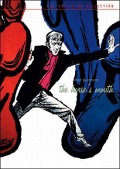
Directed by
Ronald Neame
97 minutes
Rated PG
Reviewed by
Bernard Hemingway

The Horse's Mouth
Synopsis: Gulley Jimson (Alec Guinness) is an aging, impoverished artist with a reputation as a genius and impossible behaviour. Just released from Wormwood Scrubs prison he goes in search of the means to realize his grand painterly vision but, as ever, misfortune dogs his path.
Perhaps it’s just me but Alec Guinness is not well-suited, gravelly voice notwithstanding, to the role of Gulley Jimson, the (anti-) hero of Joyce Carey’s hugely successful novel of the same name. Which is more than a pity as the adaptation was a labour of love for Guinness, who wrote the screenplay, formed a production company to make the film and played the central character, an incorrigible rogue who cares for nothing but his artistic vocation.
For a self-centered character like Jimson to be credible he needs to have considerable charm and force of personality but as played by Guinness he is permanently cantankerous and scornful and despite the value of his/Carey’s observations on the nature of painting and his feisty disregard for bourgeois conventionality there is no tangible sense of the larger man that could over-ride his curmudgeonly hostility and wantonly destructive and criminal behaviour. That is, the character simply fails to engage our empathy. (I’ve always thought that Robert Newtown’s turn as Lukey in Carol Reed’s The Odd Man Out, 1947, had the seeds of a great Jimson)
Kay Walsh as Coker, Jimson’s knockabout ‘companion’ and Renee Houston as his ex-wife are far more credible characters although Michael Gough as Jimson’s sculptor colleague suffers even more from the same kind of two-dimensionality as Jimson. The film too has trouble reconciling the dramatic pathos of Carey’s original text (freely adapted by Guinness) with its supposedly crowd-pleasing comic japes, some of the latter being typical of the quaint standard of British film comedy of the period, the two aspects working against each other so that, depending on your perspective, the film is either not serious enough, or not funny enough (the latter was the view at the time).
There’s some nice colour photography by Arthur Ibbetson of late 1950s London which is a pleasure in itself but I remained unconvinced by John Bratby’s interpretations of Gimson’s paintings which look more like something one would see on a kindergarten wall than demonstrations of serious painterly intent.

Want more about this film?


Want something different?




